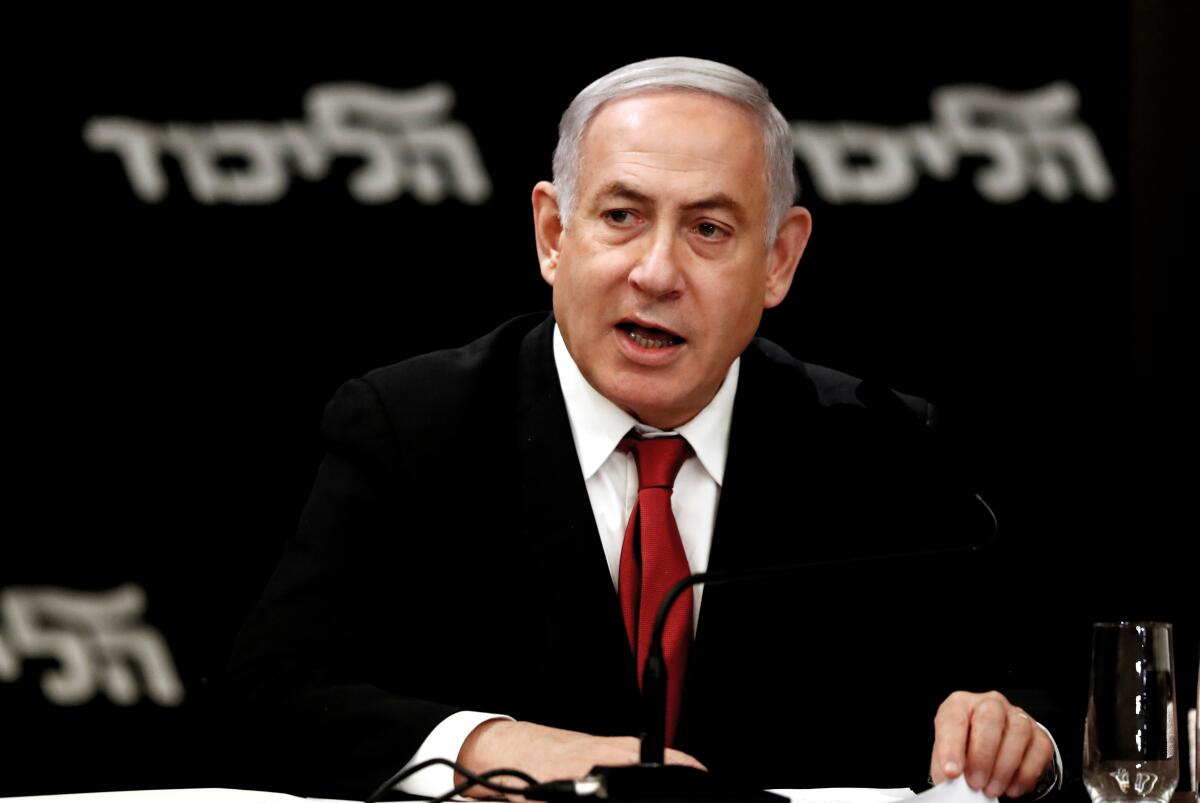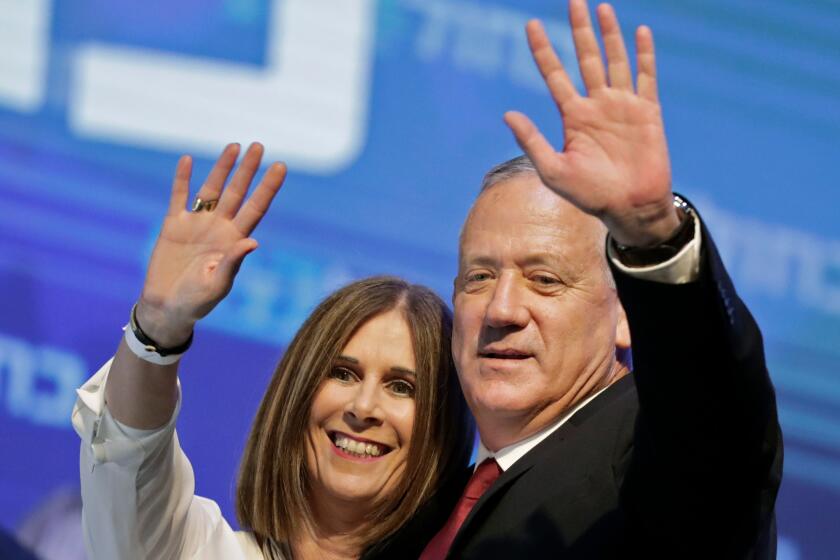‘Time for action’ in Israel, after Netanyahu fails to form a government

- Share via
JERUSALEM — It took Israeli Prime Minister Benjamin Netanyahu a little over a month to acknowledge that even after two brutal national election campaigns, he remained unable to form Israel’s next government.
On Monday night, in a defiant video, he announced that his efforts had fallen short and that he would hand the “mandate” to form a government back to President Reuven Rivlin, who almost immediately announced that he would ask opposition leader Benny Gantz, a former army chief of staff, to attempt to succeed where Netanyahu had failed.
For the record:
12:20 p.m. Oct. 22, 2019An earlier version of this article stated that the Jewish holiday of Simchat Torah celebrated the handing down of the Hebrew Bible, the Torah, from Mt. Sinai. That event is commemorated by another holiday, Shavuot.
On Tuesday, for the first time in 11 years, a man other than Netanyahu will be tasked with leading Israel.
Netanyahu laid blame for his failure squarely on Gantz’s shoulders, saying the general’s “recalcitrance” and reliance on the support of Arab-majority parties kept the two of them from forming a power-sharing government of national unity. Gantz and his Blue and White party narrowly edged Netanyahu’s Likud Party in voting in September, but were unable to attract enough support from smaller parties to form a government.
“The time for spin is over,” Blue and White declared in a published statement. “Now is the time for action. Blue and White is determined to form a liberal national unity government led by Benny Gantz, whom the people elected about a month ago.”
An aspiring prime minister must have the support of a majority of the 120 members of the Knesset, Israel’s parliament, to present a government. For now, Gantz has 54 endorsements, and Netanyahu 55, with 11 lawmakers committed to neither of them. Because Netanyahu was able to secure more votes in parliament, if not at the ballot box, Rivlin gave him first crack at creating a government.
Gantz, 60, promises to heal sectarian divisions and shore up the institutions of Israeli democracy after the unruly last years of Netanyahu’s decade in office, in which he has condemned Israel’s large Arab minority, 20% of the population, as supporters of terror and, as corruption investigations piled up, accused the press, the police, the judiciary and Rivlin, a fellow member of the Likud, of participating in a left-wing conspiracy against his rule.
The taciturn former army chief of staff and leader of the Blue and White party emerged onto the political scene six months ago and has done the seemingly impossible.
If Gantz also comes up short, the deadlock is likely to lead Israel to a third round of elections in less than a year.
Netanyahu vowed to remain firmly in the political fray, no matter what comes next.
Outlining a scenario in which Israel would no longer be able to fend for itself against the threats of Iran and the militant groups it supports — Hamas and Hezbollah — Netanyahu said in the video that “if Gantz is tempted into forming such a dangerous government, I will lead the opposition and work together with my colleagues to topple it rapidly.”
The matter, however, may not be entirely in his hands.
Early this month, Netanyahu — and Israel — entered uncharted waters when he underwent a four-day hearing led by Atty. Gen. Avichai Mandelblit, the final step before criminal indictments, which are expected to be formally served next month.
He is the first Israeli prime minister to face indictment while in office. He is accused of fraud, bribery and breach of trust in three unrelated cases involving the alleged exchange of gifts for political favors and his alleged improper intervention with media companies and regulators so as to receive positive news coverage.
Netanyahu denies all the charges and has called the investigations “a witch hunt.”
He has refused to consider resigning, as all ministers other than the prime minister are required by law to do if facing criminal proceedings.
One of Gantz’s electoral slogans, plastered in English on highways and in city squares across the country, was the pun “crime minister.”
Gantz repeatedly disparaged Netanyahu’s attempts at coalition building, referring to their aim as an “immunity government,” not a governable coalition, and said he would enthusiastically pursue a coalition with Netanyahu’s party, the Likud, under any other leader. He also objected to Netanyahu’s insistence that, if the two agreed to rotate the position of prime minister, Netanyahu would go first.
In a statement after one of the fruitless attempts at intraparty talks, Blue and White said the Likud showed its real hand by “sticking to its precondition of Netanyahu first.”
Monday’s stalemate, in which Netanyahu formally slid from the perch of a presumptive prime minister to outgoing prime minister, thrusts Israel further into uncharted judicial and political waters.
The legal analyst for Channel 13 news, Aviad Glickman, who broke numerous headlines related to the investigations into Netanyahu’s conduct, and who was personally accused by the prime minister of being a member of a left-wing enemy cabal, said in an interview that “from the minute Gantz has the mandate, the legal situation changes.”
As long as Netanyahu remains prime minister, he would enjoy the limited immunity of being able to serve while defending himself in court. Under Israeli law, a prime minister is the only elected official who can remain in office while under indictment.
But once Mandelblit announces a final decision on indictments, “if the mandate is in Gantz’s hands we enter a very delicate and different situation,” Glickman said.
“As soon as the future government is no longer in his hands, he is no longer a regular prime minister, he’s an outgoing head of government and a candidate who could not form a government, and we’re in unmapped territory.”
In such a case, Mandelblit is likely to have to determine whether Netanyahu can continue in office as a caretaker prime minister until a new government is formed.
Political support for Netanyahu has appeared to soften since the election, with several prominent members of his party, including the former mayor of Jerusalem and the current head of the Mossad, Israel’s intelligence agency, announcing their interest in succeeding him.
Monday was Netanyahu’s 70th birthday and was supposed to be a momentous day in the life of Israel’s longest-serving prime minister.
It fell, coincidentally, on the day of Simchat Torah, one of the most joyful holidays in the Jewish calendar, marking the conclusion of the annual cycle of synagogue readings of the Hebrew Bible and the start of a new cycle.
In morning services, the final portion of Deuteronomy is read aloud, followed immediately by the first portion of Genesis.
On Monday night, Chabad, the one of the largest Orthodox Jewish movements worldwide, posted a picture no less symbolic of the inevitable passage of time: Benny Gantz, wearing a bright blue yarmulke, encircled by eminent rabbis and seemingly without a care in the world, dancing to celebrate the day Jews start anew to read the story of their creation.
.
More to Read
Sign up for Essential California
The most important California stories and recommendations in your inbox every morning.
You may occasionally receive promotional content from the Los Angeles Times.











